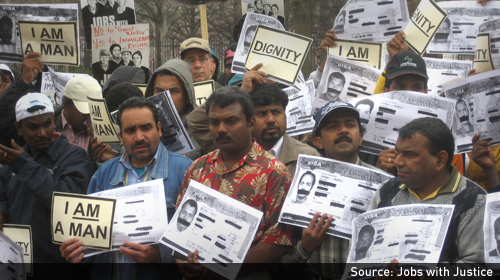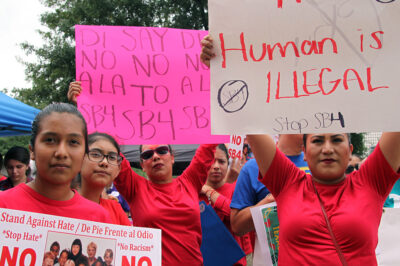Prestigious Law Firms Join Fight for Guestworkers' Rights in Major Human Trafficking Case (UPDATED)


UPDATE (8/8/2013): Five additional lawsuits were filed today against Signal International LLC on behalf of 60 Indian guestworkers, accusing the shipbuilder and its network of recruiters and labor brokers of trafficking 500 Indian guestworkers to the United States. The suits were filed by Skadden, Arps, Slate, Meagher & Flom LLP; DLA Piper; Fredrikson & Byron P.A.; McDermott Will & Emery; and the Equal Justice Center and University of Texas Law School Transnational Worker Rights Clinic. Today’s filings follow on the heels of three lawsuits filed in May of this year; in total, close to 180 of the trafficked guestworkers are represented by some of the nation’s most prestigious law firms and organizations in this unprecedented challenge to modern-day slavery. Additional suits are expected to be filed in the near future.
Eighty-three Indian guestworkers who fell victim to a massive human trafficking scheme filed suit today against Signal International, LLC. The lawsuits allege that the defendants trafficked over 500 Indian guestworkers after Hurricane Katrina and forced them to work for Signal in grossly exploitative and abusive conditions after they were lured to the United States under fraudulent assurances of becoming lawful permanent U.S. residents.
Today’s filing represents an unprecedented collaborative effort by several of the country’s most prestigious law firms to prosecute, on a pro bono basis, multiple human trafficking and racketeering lawsuits against Signal and its network of recruiters and labor brokers. In addition to the lawsuits filed by the three firms today, five other law firms have agreed to represent more than 100 additional trafficked workers.
The cases stem from a suit filed in 2008 on behalf of 12 workers represented by the ACLU, the Southern Poverty Law Center, the Asian American Legal Defense and Education Fund, the Louisiana Justice Institute, and Crowell & Moring LLP. Today’s filings come after a federal judge in New Orleans ruled in January 2012 that our case could not be brought as a class action for procedural reasons, and that additional cases had to be brought individually.
In the aftermath of Hurricane Katrina, Signal, a huge company that builds and repairs ships and offshore oil drilling rigs, brought our clients and some 500 other guestworkers from India to work as welders and pipefitters in its Texas and Mississippi shipyards. The men paid up to $20,000,each – several years’ worth of wages in India – and in many cases sold their homes and went into crippling debt in exchange for the false assurance of green cards. They traveled to the United States after the recruiters confiscated their documents, and threatened them with legal and physical harm if they refused to work.
The men arrived in the United States with H-2B temporary work visas, documents fundamentally incompatible with obtaining the green cards they had been promised. This was not the only false promise: instead of the housing they had been shown in PowerPoint presentations during the recruitment process, they were forced to live under guard, in overcrowded and racially segregated “mancamps” where they slept 24 people in a trailer, in conditions even Signal has acknowledged did not comply with the basic health and safety standards required by law. Signal also admitted in internal emails that the dining facilities in which the workers ate were “disgusting” – so much so that the company “prayed” they would go undetected by health inspectors.
It doesn’t stop there. The workers didn’t just have to live in these racially-based ghettos where sickness was rampant due to overcrowding; they had to pay for them – a whopping $1,050 deducted from each monthly paycheck. In a blunt admission that Signal had every intention of exploiting its workers to the maximum, its CFO referred to the mancamps as “profit centers,” which earned the company more than $730,000 in revenue in 2007. And the company found other ways to make money off the workers, who were subject to regular searches and had to pay a $250 fine – or $500 for a second offense – for violating the mancamps’ “No Visitors” and “No Alcohol” rules. Those penalties only applied to Signal’s Indian labor force. To keep workers “in line,” the policies were enforced by the guards who checked their bags upon entering the mancamps, and occasionally conducted searches of their bunks and belongings.
This shocking discriminatory treatment formed part of the basis for a separate lawsuit filed against Signal by the U.S. government’s Equal Employment Opportunity Commission, alleging that the Indian workers were victims of discrimination based upon their race and national origin, as well as victims of retaliation by the company that targeted workers that sought to assert their lawful workplace rights.
Tragically, this story is not unique. It fits a template of modern-day bondage that the U.S. guestworker program actually enables through its flawed structure and absence of protections. A lack of U.S. oversight of recruiters abroad (as well as of the employers who hire them) means they have free rein to lie, while employers benefit from those lies. The fact that workers frequently pay huge sums of money for recruiting, visa processing, and travel fees makes them vulnerable when they arrive in this country in mountains of debt. And the guestworker visas bind them to one employer, which means that deportation or undocumented work is the only path for those seeking to leave abusive workplaces. (Read more here about the protections for guestworkers that comprehensive immigration reform must include.)
In March 2007, Signal representatives learned that some of the workers had been meeting with outside attorneys to seek information about their rights. In retaliation, the workers and others were fired, rounded and locked up, and told they would be swiftly deported. One of the workers, faced with returning to India in crushing debt, attempted to commit suicide.
Thankfully, that worker survived. He and his fellow workers are no longer under Signal’s oppressive thumb, and they are demanding accountability. And as is evidenced by today’s unprecedented collaboration of so many prestigious law firms, the fight for justice will continue until the abusers are held to account and safeguards are in place to ensure all forms of modern-day slavery are banished once and for all.
Learn more about human trafficking and other civil liberty issues: Sign up for breaking news alerts, follow us on Twitter, and like us on Facebook.





